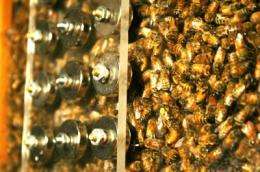Sleepless honey bees miscommunicate, too, research shows

In the busy world of a honey bee hive, worker bees need their rest in order to best communicate the location of food to their hive mates, research from The University of Texas at Austin shows.
"When deprived of sleep, humans typically experience a diminished ability to perform a variety of tasks, including communicating as clearly or as precisely," said Dr. Barrett Klein, a former ecology, evolution and behavior graduate student at the university. "We found that sleep-deprived honey bees also experienced communication problems. They advertised the direction to a food site less precisely to their fellow bees."
For humans, imprecise communication can reduce efficiency, cost money, and in some cases, cost lives. For honey bees, Klein says it could affect their success in locating food, which could lead to a less competitive colony.
"While the importance of sleep has been studied in Drosophila flies for several years," said Dr. Ulrich Mueller, professor of biology and study coauthor, "Barrett's study is the first to address the function of sleep in a social insect in the context of its society, and the first to show that sleep deprivation impairs precision of communication in an insect."
The research was published in PNAS Early Edition this week.
There are various ways to poke and prod humans to force them to stay awake prior to measuring the effects of sleep deprivation. But how to make bees in a hive lose sleep?
Klein invented a magnetic machine aptly named the "insominator," a contraption he passed over quietly resting bees during the night to deprive them of sleep. The bees, outfitted with small metallic backpacks, were jostled into activity by magnets in the insominator, and this was repeated over the course of normal sleep time.
Barrett then recorded the behaviors of the sleepless bees and discovered they weren't able to communicate as well the direction of nectar-filled flower patches to their sisters through their usual waggle dance.
"The dance was not necessarily wrong, but it was less precise than dances performed by bees that were not sleep-deprived," says Klein. "We expect that a less precise dance would lead to fewer followers making it to the food source, and we hope to test this in the future."
Provided by University of Texas at Austin













